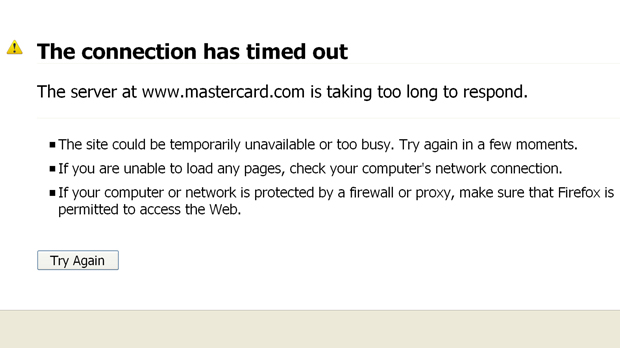Mastercard website attacked as part of WikiLeaks protest
As hackers claim to have brought down Mastercard’s website in revenge for the firm suspending services WikiLeaks, Julian Rush explains what “Distributed Denial Of Service” really means.
“Anonymous”, understood to be a loose-knit group of internet activists, said via Twitter: “We are glad to tell you that www.mastercard.com is down and it’s confirmed.”
Another message read: “There are some things WikiLeaks can’t do. For everything else, there’s Operation Payback.”
The attack is known as a “distributed denial of service” attack (DDoS) and is the same type of internet campaign which has been used against WikiLeaks in recent weeks.
DDoS attacks, which are illegal in the UK, involve overloading a website with requests so it stops working. DDoS attacks also appeared to have been launched against PayPal, PostFinance, and the Swedish prosecutor’s office.
‘Hacktivism’
The campaigners, dubbed “hacktivists”, describes themselves as part of Operation Payback, “an ongoing campaign by Anonymous against major anti-piracy and anti-freedom entities.”
An activist taking part in the campaign told the Guardian newspaper that the attack was “supporting WikiLeaks not because we agree or disagree with the data that is being sent out, but we disagree with any from of censorship on the internet.”
Science Correspondent Julian Rush explains the attacks on Mastercard
The attack on Mastercard is what's called a DDoS - Distributed Denial Of Service.
It works by flooding a website with requests to access its pages with the result that the server hosting the website collapses under the demand and goes offline.
Usually a DDoS is carried out by what are called "botnets" that have been surreptitiously put on hundreds of computers by infecting them with a Trojan or a worm.
Once enough are installed, the owner of the botnets sends them a message to launch the attack on the target web site, all without the knowledge of the computer's unwitting owner.
But in the case of the attacks related to Wikileaks, called Operation Payback, it seems many of the attackers have voluntarily downloaded software that can be programmed to target a web site at an agreed time.
In keeping with the gaming and piracy roots of those thought to be behind the DDoS attacks, a loose-knit and fluid group called "Anonymous" with no structure or leadership, who are best known for their concerted attacks on the Church of Scientology, the software sounds like a space weapon. It's called LOIC - the Low Orbit Ion Cannon.

On Saturday it emerged online payments processor PayPal had cut access for donations to WikiLeaks, with the company saying its payment service cannot be used for activities “that encourage, promote, facilitate or instruct others to engage in illegal activity”.
A spokesperson for PayPal said: “We can confirm that there was an attempted DDoS attack on paypal.com. The attack slowed some payments down for a short while but we remained fully operational throughout.”
Channel 4 News Foreign Correspondent Jonathan Rugman has interviewed a spokesman for WikiLeaks who said that, although the organisation had not sanctioned the attacks on MasterCard and others, it would not condemn them.
Kristinn Hrafnsson also confirmed that the drip-feed of US diplomatic cables which have been at the centre of political soul-searching and condemnation in the past fortnight will continue into the new year.
He warned that the next tranche would include cables about the Vatican and Israel.
In 2008 More4 News reported on efforts by the “Anonymous” group to stage protests against the Church of Scientology. See below to view the report.